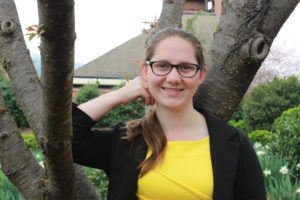
Sabrina McAllister, a senior majoring in Psychology, was one of the thirteen students selected into the 2017 Summer Scholars program. Over the summer, she was able to work with her faculty advisor, Dr. David Nichols, to complete her research project titled “Time Perspective as a State-Based Measure”.
“My project is on time perspective (the way a person orients him/herself towards the past, present, or future). I am focusing specifically on the Zimbardo’s Time Perspective Inventory (ZTPI), which is the most popular measure of time perspective in the psychology literature. I am examining its structure to determine ways in which it can be improved and modified to provide more valid and reliable results”.
Sabrina first got into her project through Dr. Nichols.
“My advisor had been previously doing research on time perspective when I started working with him. The first project I took on under his supervision was a literature review that combined sensation-seeking and time perspective, which was how I was introduced to the ZTPI. As I did the reading for my paper, I realized that there seemed to be a lot of uncertainty in the literature regarding Zimbardo’s questionnaire, so I made it my next project to improve on some of that”.
Sabrina decided to apply to be a summer scholar so she could work on her research project without having to worry about getting distracted by classes and campus events. She was able to work closely with her research advisor throughout the summer.
“My research advisor is very helpful. He has given me several bits of advice and taught me new things. I think the best part of working with him is the amount of independence he provides. I can ask direct questions if I’m unsure of something, but most of the time, I’m given an instruction and some resources, and I figure it out myself. It can be more work this way, but it allows me to learn a lot in a very short amount of time, which is thrilling”.
Sabrina has learned quite a bit from working on her project.
“I’ve gained an understanding of statistical concepts that are not included in the standard statistics curriculum, and I’ve gained computer skills that will be useful throughout my life, on the job and off. I am also currently working on writing a final manuscript for my project, and I expect that, as I continue it, I will learn about the nuts and bolts of scientific writing that I haven’t yet come across. It will continue to be lots of intensive work and require ample amounts of time, but it will be worth the effort because, by the end of it, I will have completed two project defenses, presented at a campus poster session, and at a national conference. I also intend to submit the manuscript for publication in the spring, which will be an exciting milestone in both my academic and professional career”.
To anyone considering doing research, Sabrina’s advice is to get started right away.
“Research is time-intensive and long-winded, but it’s very rewarding and beneficial. You’ll get the most out of it if you do it for more than just one or two semesters. I started research in my department during my very first semester, and I wouldn’t have come this far or learned this much if I hadn’t spent this much time with it. If it’s something you’re strongly interested in, contact the people in your department. Even if your first choice of advisor isn’t available, get your foot in the door and do a little bit of something with someone. It’s not a four-year commitment! See what options are available to you, and take advantage of them. Also, don’t be afraid to be original. Most of the research students I’ve talked to came up with their project on their own, pitched the idea to their advisor, and ran with it from there; so you should definitely feel free to explore your own interests”.